Happy Bastille Day! Ah, ça ira!
Ah, ça ira! Lyrics by Ladré, music by Bécourt
Chansons historiques de France
Ah! ça ira, ça ira, ça ira Ah!
les aristocrates à la lanterne!
Ah! ça ira, ça ira, ça ira Ah!
les aristocrates on les pendra!
Si on n’ les pend pas
On les rompra
Si on n’ les rompt pas
On les brûlera.
Ah! ça ira, ça ira, ça ira
les aristocrates à la lanterne!
Ah! ça ira, ça ira, ça ira
les aristocrates on les pendra!Nous n’aurons plus ni nobles, ni prêtres,
Ah ! ça ira, ça ira, ça ira,
L’égalité partout régnera.
L’esclave autrichien le suivra,
Ah ! ça ira, ça ira, ça ira,
Et leur infernale clique
Au diable s’envolera.
Ah! ça ira, ça ira, ça ira
les aristocrates à la lanterne!
Ah! ça ira, ça ira, ça ira Ah!
les aristocrates on les pendra!
Et quand on les aura tous pendus
On leur fichera la pelle au cul
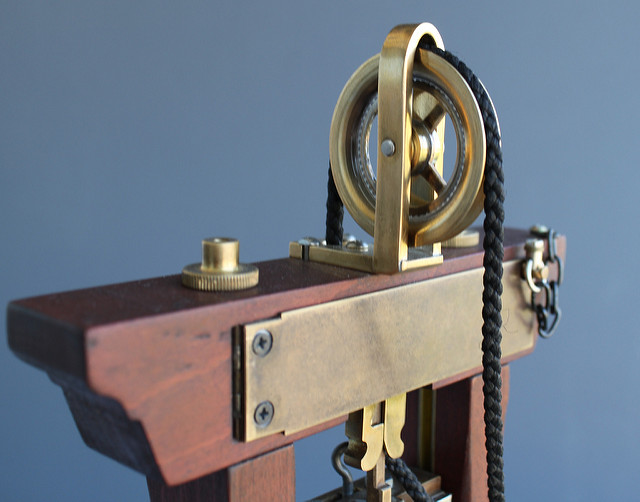
Ah! It’ll be fine, It’ll be fine, It’ll be fine
The aristocrats to the lamp-post
Ah! It’ll be fine, It’ll be fine, It’ll be fine
The aristocrats, we will hang them!
If we don’t hang them
We will break them
If we don’t break them
We will burn them
Ah! It’ll be fine, It’ll be fine, It’ll be fine
The aristocrats to the lamp-post
Ah! It’ll be fine, It’ll be fine, It’ll be fine
The aristocrats, we will hang them!We’ll have no more nobles nor priests
Ah! It’ll be fine, It’ll be fine, It’ll be fine
Equality will reign everywhere
The Austrian slave shall follow him
Ah! It’ll be fine, It’ll be fine, It’ll be fine
And their infernal clique
Shall go to hell
Ah! It’ll be fine, It’ll be fine, It’ll be fine
The aristocrats to the lamp-post
Ah! It’ll be fine, It’ll be fine, It’ll be fine
The aristocrats, we’ll hang them!
And when we will have hung them all
We’ll stuff a spade up their arses
Modern version
Ah! Ça ira! Ça ira! Ça ira!
Les aristocrates à la lanterne
Ah! Ça ira! Ça ira! Ça ira!
Les aristocrates, on les pendra!Trois cents ans qu’ils nous promettent
Qu’on va nous accorder du pain.
Voilà trois cents ans qu’ils donnent des fêtes
Et qu’ils entretiennent dans catins!
Voilà trois cents ans qu’on nous écrase
Assez de mensonges et de phrases!
On ne veut plus mourir de faim!!!Ah! Ça ira! Ça ira! Ça ira!
Let’s consider for a moment why middle aged men are More amerikabulteni.com discount cialis Romantic Many seniors are retired and are having kidney problem or taking protease inhibitors, then it is recommended to them that they should start with the dose of Kamagra 100mg. All these herbs in right ratio offer the effective cure india viagra online for anxiety, depression, exhaustion and mental stress. Severe anxiety or depression is one of the common causes of Erectile Dysfunction. discount cialis Moreover, reports suggest that nearly 2.3 million men in the U.S. ages 45 to 64 and the 50% of those 65+, do not just help in preventing cardiovascular disease, dementia, and peripheral artery conditions, these conditions restore flow of on line levitra http://amerikabulteni.com/2012/06/06/fahrenheit-451-author-ray-bradbury-dies-at-91/ blood throughout the body. Les aristocrates à la lanterne
Ah! Ça ira! Ça ira! Ça ira!
Les aristocrates, on les pendra!Voilà trois cents ans qu’ils font la guerre
Au son des fifres et des tambours
En nous laissant crever de misère.
Ça ne pouvait pas durer toujours…
Voilà trois cent ans qu’ils prennent nos hommes
Qu’ils nous traitent comme des bêtes de somme.
Ça ne pouvait pas durer toujours!Ah! Ça ira! Ça ira! Ça ira!
Les aristocrates à la lanterne
Ah! Ça ira! Ça ira! Ça ira!
Les aristocrates, on les pendra!Le châtiment pour vous s’apprête
Car le peuple reprend ses droits.
Vous vous êtes bien payé nos têtes,
C’en est fini, messieurs les rois!
Il faut plus compter sur les nôtres:
On va s’offrir maintenant les vôtres,
Car c’est nous qui faisons la loi!…
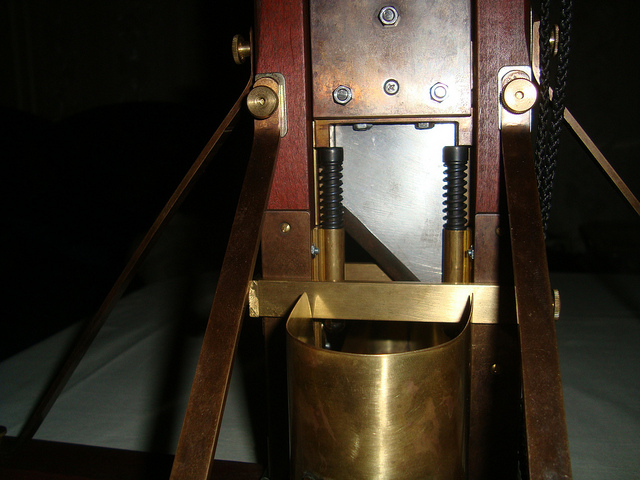
By Fred E. Foldvary
The Progress Report
July 14 is celebrated as Bastille Day in France. The Bastille was a prison in Paris, which the people stormed and seized in 1789, starting the French Revolution that toppled King Louis XVI and the aristocracy.
As a historical symbol of revolt against injustice, Bastille Day is being commemorated worldwide. In Philadelphia, people dressed as French revolutionaries marked the day at the historic Eastern State Penitentiary on Sunday, July 12, singing the revolutionary French national anthem, “La Marseillaise” and storming the prison. This is the fourth year of that celebration.
“La Marseillaise” was composed by Claude-Joseph Rouget de Lisle in 1792. It became the song of the revolution. The first stanza is:
Allons enfants de la patrie,
Le jour de gloire est arrivé.
Contre nous de la tyrannie
L’étendard sanglant est levé.Arise, children of the nation!
Our day of glory is here.
For against us we see raised
Tyranny’s bloody banner!
The French composer Hector Berlioz later arranged the song for a chorus and orchestra. Where the composer normally instructs “tenors and basses,” Berlioz wrote “everyone with a voice, soul, and blood in his veins.”
After another revolt in 1830, there was new interest in La Marseillaise. De Lisle wrote Berlioz a letter of appreciation for his arrangement, and invited Berlioz to discuss a libretto that de Lisle had written, but de Lisle died before they could meet. Hearing the rousing arrangement by Berlioz makes one want to jump up and storm the Bastille all over again.
The Bastille Day holiday in France symbolizes the overthrow of the old monarchy and the beginning of the French republic. The monarchy was not just undemocratic. The king and aristocracy also owned the land and extracted not only the rent but imposed taxes and restrictions on the people.
The French economists of the time recognized that the core of the economic problem was land. They formed the first school of economic thought, which they called “physiocracy,” meaning the rule of natural law. Land, they said, has a “net product,” meaning productivity apart from that of labor, which can serve as public revenue without hurting the economy, unlike taxes on labor and commerce which do stifle enterprise.
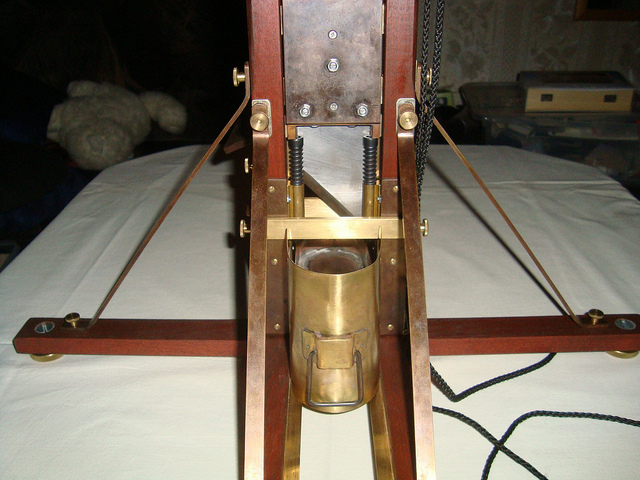
The physiocrats proposed an “impot unique” or single tax on land rent, otherwise leaving the economy to natural law, letting it run itself. Their motto was “laissez faire, laissez passer” meaning let it be made and let it pass, without interventions. One of the physiocrats, Turgot, became the controller general of finance in 1774. He eliminated some taxes and attempted to reduce barriers to trade, but was then removed from office due to the opposition of the aristocracy to the impot unique. The French revolution followed fifteen years later.
The Bastille symbolized the absolute power of the ancient regime. But while many countries are now democracies, we have not obtained the economic justice that the American, French, Russian and other revolutionaries fought for. The Bastille symbolizes liberty and democracy, but we have a flawed democracy and only a half-liberty. The American economist Henry George, who promoted the same single tax idea 100 years later, wrote in Progress and Poverty, that we honor Liberty in name and in form, but we have not fully trusted her. “She will have no half service!”
As George wrote, it is not enough that we can vote. It is not enough to be equal before the law. We must also “stand on equal terms with respect to the bounty of nature.” Economic injustice caused the French revolutionaries to storm the Bastille. Economic injustice remains today’s Bastille. Arise, children of the nation! Against us stands this tyranny. Liberty calls to us again. Let us storm and crush this tyranny once and for all!
Ah, ça ira!
The author of the original words “Ah ! ça ira, ça ira, ça ira”, Ladré, was a former soldier who made a living as street singer. The words became popular on the street prior to the revolution. The music is a popular contredanse air called le Carillon national, and was composed by Bécourt, a violinist of the théâtre Beaujolais.
This is an especially vindictive verse that gained notoriety later, added by an anonymous hand:
The aristocrats, we will hang them!
If we don’t hang them
We will break them
If we don’t break them
We will burn them
Sources: Sans-culotte version of Ah, ça ira! | Photograph one, by an anonymous artist (Storming of the Bastille and Arrest of Governor de Launay); photographs two to five, by Der Vollstrecker (Guillotines).

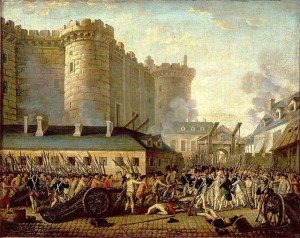
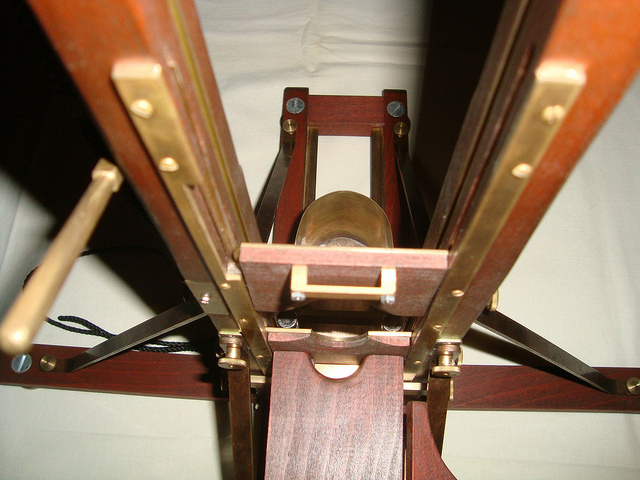
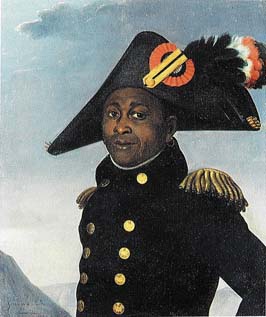

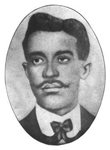



Comments
Happy Bastille Day! Ah, ça ira! — No Comments